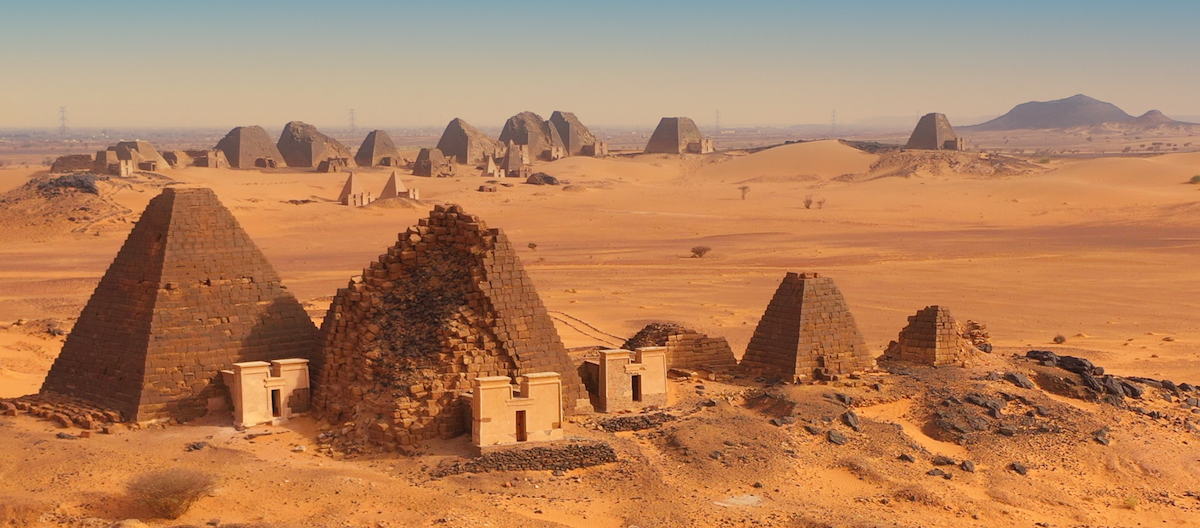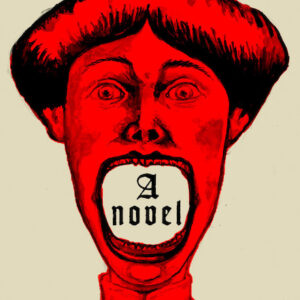Today, Sudan and its glittering capital, Khartoum, are under siege as conflicts simmering for decades have manifested into full-blown war. Hundreds of thousands of people have already been displaced, the death toll is increasing, the country’s rich resources are being plundered, and the damage to architecture and infrastructure has become unimaginable.
Sudan’s location on the African continent is unique. The country straddles North, East and Central Africa, as well as the Middle East just across the Red Sea, thus allowing it to ingest and subsume various identities and formations. Add to this the violent 2011 secession of South Sudan, primarily comprising various Nilotic groups, and the political and cultural complexities only begin to deepen.
Sudan’s vastness—geographic and historical—means that a body of cohesively Sudanese national literature remains an ever-moving goalpost. Sudan has a vibrant literary culture where poetry and short stories thrive, and despite a censorious three-decade regime, the sheer volume of books published and circulating all over the country is dizzying.
These days, as the world seeks to grasp the events in Sudan, there is a spike in news coverage, policy papers and social media attention, but the polyphonic, lyrical and historically substantive nature of the novel is a great way to gain insights into the region today. Here are eight contemporary novels from and about Sudan, either written in or translated into English.
*

Hammour Ziada, The Drowning (Al-Gharaq in Arabic, 2019 and translated into English by Paul G. Starkey, Interlink Books, 2022)
“The stories would become weightier as the years passed.”
Residents of the village of Hajar Narti await an uncertain fate as a coup rages through Khartoum in 1968. The rhythms of Hajar Narti are modulated by the life-giving and life-taking quality of the river Nile that flows through it. When a body of a young drowned girl is fished out of the water, the village’s collective past resurfaces with it. Through flashbacks, The Drowning resurrects the stories of women discarded and erased over time, some due to a system of slavery that continues to be practiced in Sudan, and some who are victims of a strictly patriarchal and misogynistic society.
A formerly enslaved woman, Fayit Niddu, has a thirteen-year daughter, Abeer, who is abused and violated by many men in the village who believe they have a claim over her body. Another woman and mother, Fatima, is haunted by the drowning of her own daughter, Su’ad, over two decades ago and seeks answers in the retrieved body.
A masterful and stylistic storyteller, Ziada hails from Omdurman and is invested in questions of human rights through his work both as a journalist and as a novelist. Outcasts, misfits, marginalized yet strong women and the ever-present Nile remain at the crux of his stories, as illustrated also by the internationally acclaimed film You Will Die At Twenty (2019) based on Ziada’s story “Sleeping at The Foot of The Mountain.”
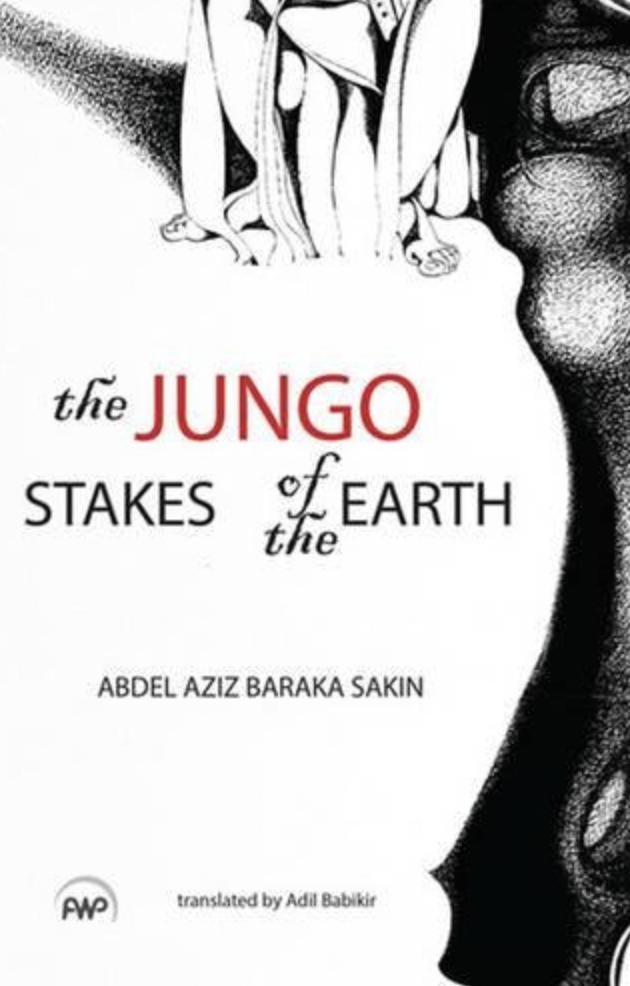
Abdelaziz Baraka Sakin, The Jungo, Stakes of the Earth (Aljungo Masameer al-Ardh in Arabic, 2009 and translation into English by Adil Babikir, Africa World Press, 2015).
“What people here say is more than mere prediction. They know. They read the future without ambiguity. They actually see it.”
In the border area of Southeastern Sudan, a group of migrant agricultural workers called the Jungo find themselves replaced and disenfranchised by modern machinery. Despite its serious premise, The Jungo, Stakes of the Earth is hardly a social realist, postcolonial novel, but rather draws from folk storytelling traditions made famous by works like 1001 Arabian Nights and Boccaccio’s Decameron. An unnamed narrator from the big city travels to these parts with his rich friend, culling loosely interconnected stories to construct a portrait of rural Sudan that is equal parts gritty, comedic, bawdy, lusty and magical.
There is the political angle expressed through the plot about the opening of a bank that would give loans to small businesses. This means that the Jungos will be pushed out further as the farmers who tend to hire them do not qualify for these loans. Sakin articulates a serious critique of the Islamic government through this plot.
A second angle is entirely sexual and involves a circulating cast of characters such as the narrator’s Ethiopian lover, Alam Gishi, an independent and fiery woman who works for brothel owner, Addai (the Mother). Alam is only paired with the narrator so he can gain some sexual experience, but soon becomes the love of his life. An anchoring character is the dandy and town gossip Wad Ammoona, who spent his childhood in a prison where his mother was incarcerated for a petty crime.
These scenes offer insights into the exploitative, grimy and bleak prison system, where sexual assault and corruption is rampant. Sakin is a giant of Sudanese literature, and one whose overtly bellicose and anti-regime works have been banned again and again in Sudan. The Jungo, Stakes of the Earth won the prestigious Tayeb Salih literary prize, but its copies were confiscated from bookstores. His works have found an audience in France, but English language publishing remains resistant to let him in. As war ravages Sudan today, his short novel, The Messiah of Darfur, available in French and the original Arabic, should be required reading.

Amir Tag Elsir, Ebola ‘76 (Ebola ‘76 in Arabic, 2012 and translated into English by Charis Bredin and Emily Danby, Darf Publishers, 2017).
“Caravans of refugees spread north and south, east and west.”
A different time and a different crisis take hold as a dangerous virus spreads havoc through Nzara, a small town in southern Sudan. Everyman Lewis Nawa infects the inhabitants with Ebola from across the border.
The novel moves across an ensemble of selfish, befuddled and frightened secondary characters, such as the celebrity musician Ruwadi, the cunning factory owner, Riyyak, town magician Jamadi, Lewis’ string of women—from wife Tina to various mistresses—and smug old Ebola itself. Despite the seriousness and urgency of the novel’s topic, Tag Elsir renders the events in a tragic-comic vein wherein biting satire, occasional allegory and coarse humor expose a world in which corruption, illiteracy and lack of reason preside.
Bodies pile up in the town-designated zone called Ebola Square, and Nzara starts to come undone, but characters continue to be reckless and self-centered as the author takes further refuge in humor. Brilliantly translated by Charis Bredin and Emily Danby, this is one of 15 novels by the prolific author. The book is a fast but guilty read in which the reader is continually implicated in feeling insensitive, as laughter, not dread, becomes the default reaction.
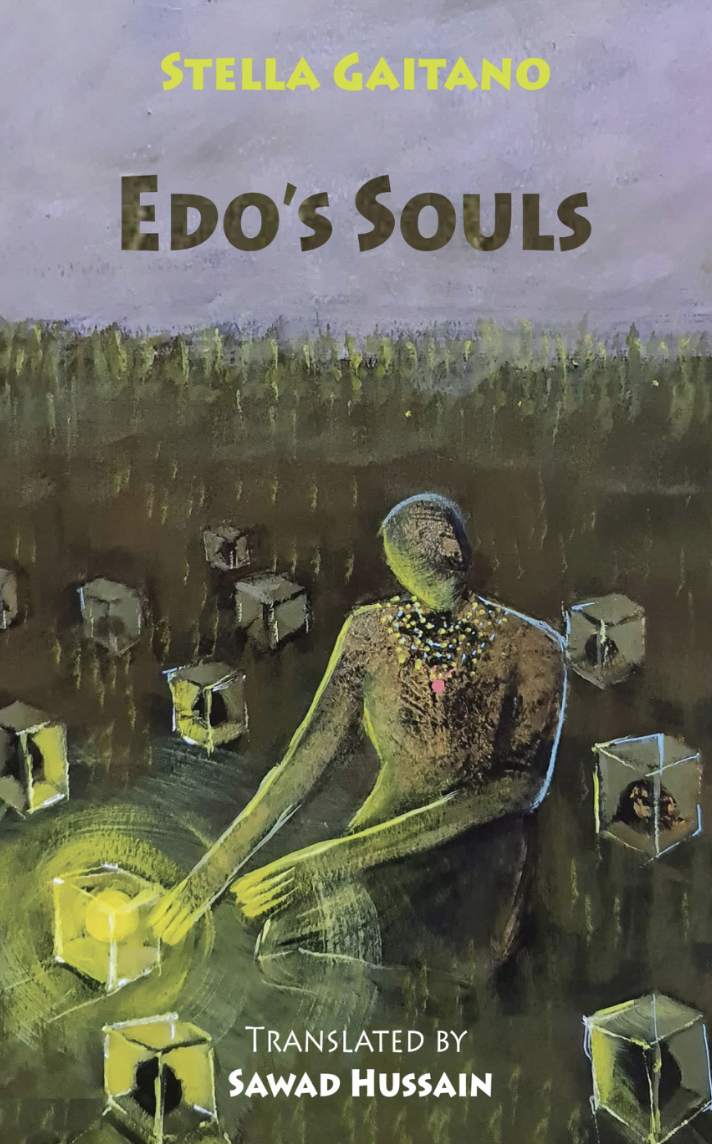
Stella Gaitano, Edo’s Souls (Arabic, 2019 and translated into English by Sawad Hussain, Dedalus Books, 2023).
“With apprehension in the air, rumours bred like fungus. Times of war were alike, infecting individuals like a disease—everyone could feel it without having anything in their power to stop it.”
As a South Sudanese writer who grew up in Khartoum and writes in Arabic, Stella Gaitano’s background is certainly unusual. But when her Sudanese citizenship was revoked after South Sudan was formed in 2011, even though she was married to a Sudanese man, it made her the quintessential casualty of a civil war and the ethno-religious strife that had raged for decades in the region. While only her longish short stories have been available in translation thus far, Edo’s Souls will become Gaitano’s first novel to become available in English.
Set in 1970s South Sudan and biblical in ambition, the novel begins with the spirited village girl, Edo, who is cursed with ten stillborn children. Despairing, but also maddened by her bad luck, Edo finds herself fornicating with the village madman, which leads to the birth of her daughter, Lucy. Beloved by the village, Lucy ends up with Marco and war forces them to relocate first to Juba, and then to Khartoum. Lucy is stunned by the city, shocked to be around Arabs, but slowly adapts and settles down after befriending Marco’s friends, Peter and his wife, Therasa. The perspective shifts to the men—first Marco, and then Peter—and eventually circles back to Lucy.
The curse of motherhood bestowed upon Lucy has been broken, and despite her sour-tasting breast milk, she still bears and raises three children. War is in both the background and foreground as the ever-growing cast of characters experience tumult, displacement, violence and heartbreak. But the souls and lives that Edo begat survive, and even thrive, and the cycle of life, birth, motherhood and death continues unabated.
Gaitano is a vivid storyteller whose style veers towards naturalism, with a tendency towards bold descriptions of smells and fluids, though she also seamlessly blends superstition, curses and phantoms. Despite the novel’s convoluted plot, sudden tonal shifts and often peculiar metaphors, Edo’s Souls is one of the most important literary contributions today for anyone seeking to grasp Sudan’s contemporary history.
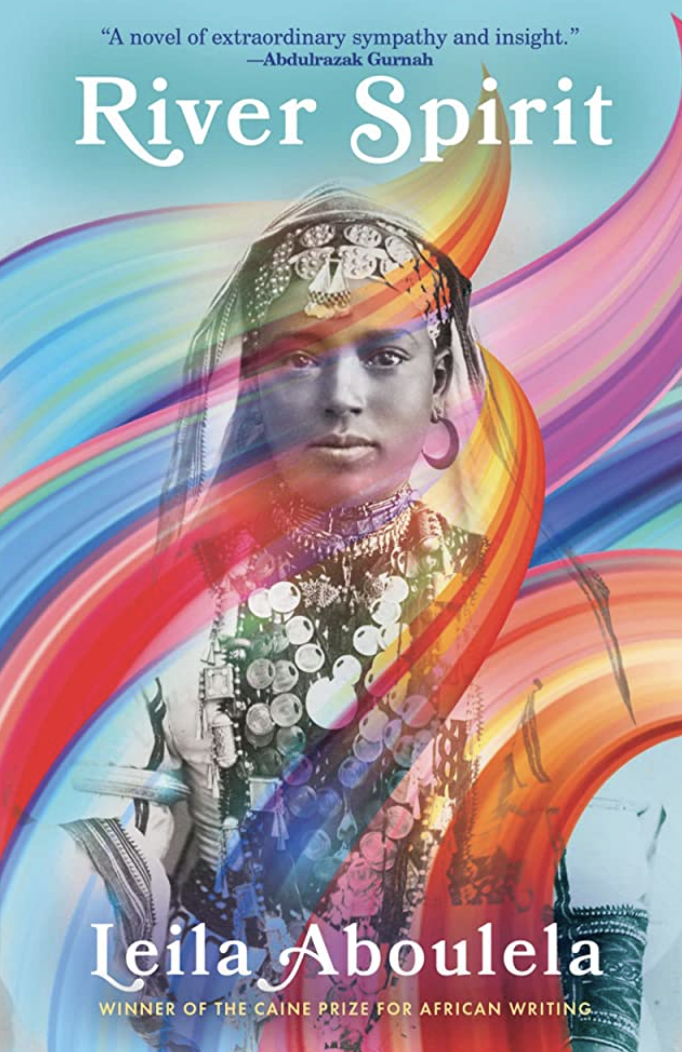
Leila Aboulela, River Spirit (Grove Atlantic, 2023)
“Water that was more than water. And here she was wading in, like she had always waded in, to listen to the language of this river, what it wanted her to know.”
An evocative and delicately composed historical novel of Sudan, River Spirit draws upon two decades of war and turbulence in the late 19th century. In the background is the violent tussle of power between the Turkish-Egyptian rulers, French and British colonialists, and the army built by the “Expected Mahdi,” the Sufi leader who convincingly claims that the Prophet has chosen him to liberate Sudan from more than six decades of foreign rule. Aboulela depicts this period of turmoil from a diverse set of perspectives in which historical figures, such as the charismatic yet tyrannical Mahdi and the ambitious colonial, General Charles George Gordon, who met his death in Sudan, mingle with fictional characters.
Though the story has a large cast, River Spirit is undergirded by three characters: Akuany, a young girl who is orphaned when she is 11 years old and embodies the titular spirit of the Nile river; Yaseen, a kind-hearted merchant who despises the Mahdi; and Robert, a Scottish engineer and painter who is inadvertently thrown into the colonial war. The war might be the main event, but the story of Akuany serves as a reminder of Sudan’s history of slavery and the difficulties of abolishing its practice.
Akuany is captured as a slave girl, sold into a wealthy, abusive home and renamed Zamzam. She is then bought by Robert, who wants a female African model to paint as he aims to capture and lock in an Africa seen entirely through his colonial gaze. Akuany holds a flame for Yaseen, who has rescued her years ago and refuses to accept her fate as servant, sitter or slave at every tumultuous phase of her life.
Along the way, the novel also chronicles the rise of the city of Omdurman, as displaced populations sink their roots and begin to build what would become one of Sudan’s most important cities. Aboulela, whose work continually centers women protagonists, is one of the most important writers from Sudan and has chronicled her country for twenty years through stories and novels written in English.
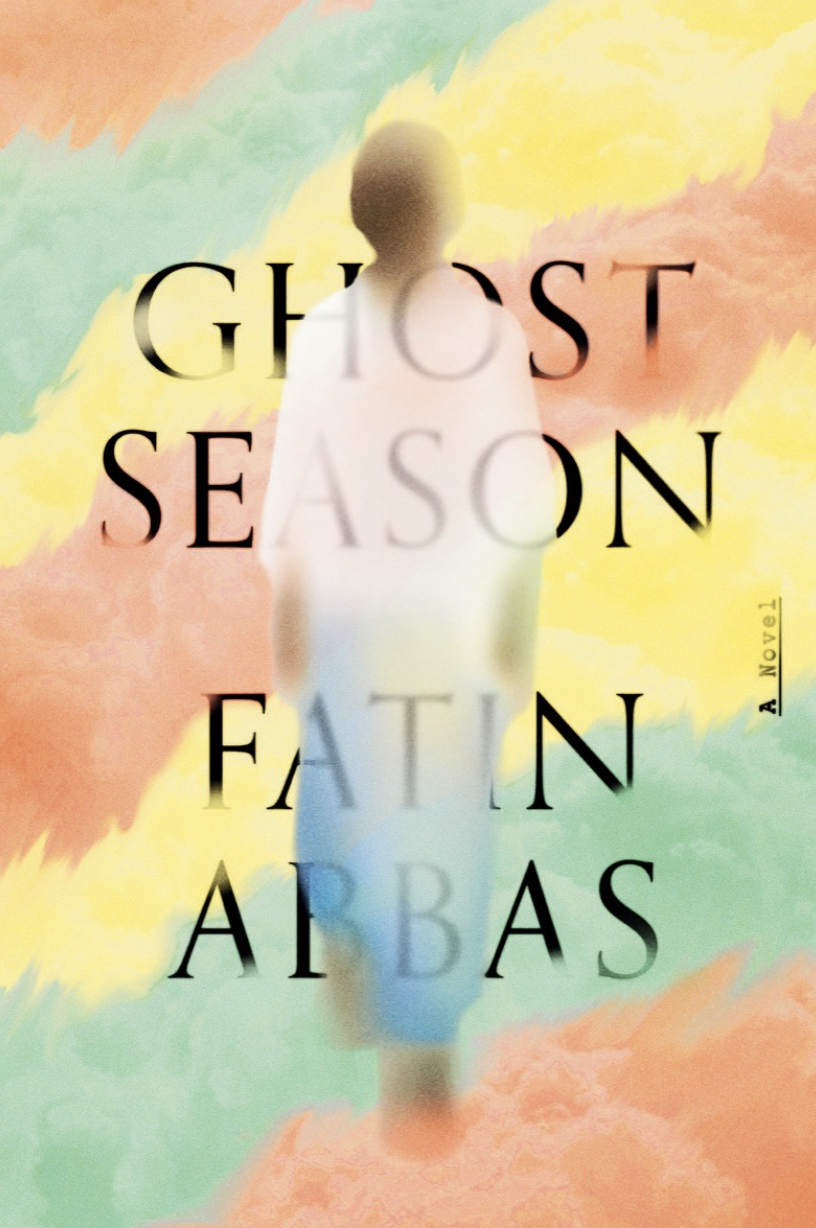
Fatin Abbas, Ghost Season (W.W. Norton & Company, 2023)
“But it wasn’t peace, it was merely quiet.”
Set in the fictional border town named Saraaya, five protagonists from different walks of life share life in a compound until political uncertainty and senseless violence disrupt their fragile harmony. The anchoring characters are Dena, a Sudanese-American documentary filmmaker accustomed to long, solitary jaunts in the region, and William, the talented and compassionate translator of Nilotic descent who is working for the white American mapmaker, Alex. The cook, Layla, from a nearby village, and Mustafa, the 12-year-old cleaner, keep the home running smoothly.
When an unrecognizably burnt corpse shows up in town, pulses quicken, priorities shift and the characters are all forced to reckon with their own agendas and ambitions. William and Layla confess their feelings for each other, leading them down a challenging path of inter-racial and inter-religious love, since William is a Catholic South Sudanese man and Layla is a Muslim Northerner. Mustafa finds himself paying a heavy price for engaging in an illicit side hustle. As war comes into their home, the unobtrusive Dena finds herself in front of the camera rather than behind it, and it is William’s body upon which the history becomes inscribed.
Alex’s privileges are also snatched away, and he too is jolted out of his comfort zone as the upheaval unfolds. Rich in description and deftly laden with the repressed and the unsaid, Abbas’ debut novel is gripping and lyrical, and skillfully woven to allow for the dynamics of a decades-long conflict to emerge gently but powerfully.
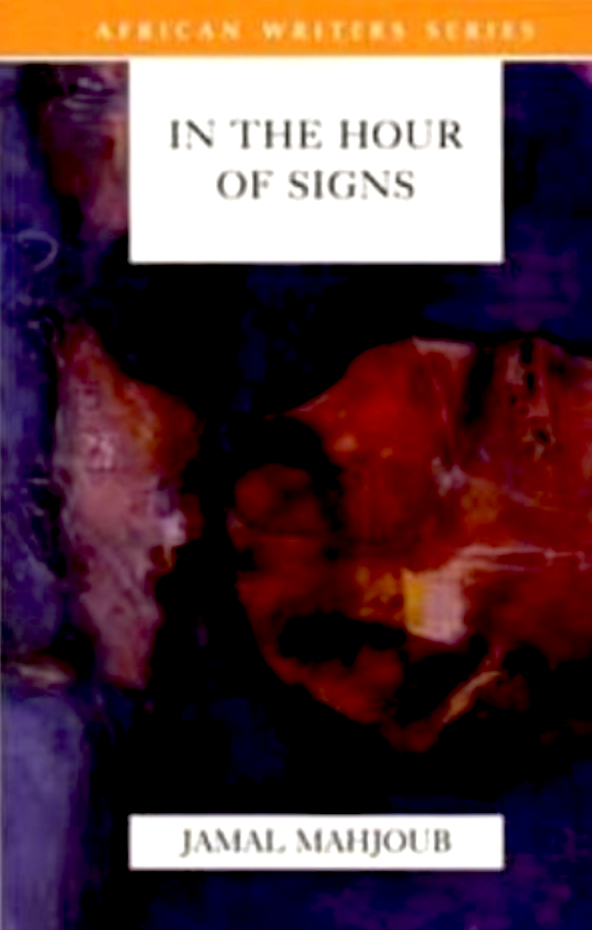
Jamal Mahjoub, In the Hour of Signs (Heinneman, 1996)
“Dark wings pass through the trees and stillness descends on them as they peer in wonder at this odd rag of a man who has been hurting them for so long.”
The Mahdist war in late 19th-century Sudan is also the subject of Mahjoub’s novel, but not with the goal to render it with historical accuracy, but rather with postmodern flair. The story is centered on the adventures of philosopher-picaro Hawi, who embarks on a search for the elusive Mahdi, the self-declared chosen one amassing an army of followers to overthrow Turkish-Egyptian rule.
Along the way, Hawi becomes embroiled in the historically significant Battle of Omdurman fought between British General Herbert Kitchener on one side and the Mahdi’s army on the other. The novel is episodic in structure, and each chapter comprises a month, a year and a location. Though In the Hour of Signs is described as an epic novel, it is the subversion of the grand, heroic themes of an epic that Mahjoub is after.
The focus is on characters that barely even make the footnotes of history—the orphans, vagrants, low-ranking soldiers, prostitutes and refugees. Though the novel is quite masculinist as a whole, the characters of the young girl, Noom, who has epilepsy, and the brothel owner, Kadaro, are compelling. The descriptive and florid prose, though sometimes a tad Orientalist, captures an arid, dusty and vast Sudanese landscape that proves unyielding for the warring factions.
In the end, this is a novel that wants to condemn war and warriors and expose the trail of grief and destruction that any conflict leaves behind. Mahjoub is a big name in Sudanese literature, and In the Hour of Signs is his third novel, as well as the last novel in what has been unofficially described as a trilogy of Sudanese political history. Mahjoub is respected as a literary writer with a penchant for stylistic experimentation, but he also moonlights as a crime fiction writer under the pseudonym Parker Bilal.
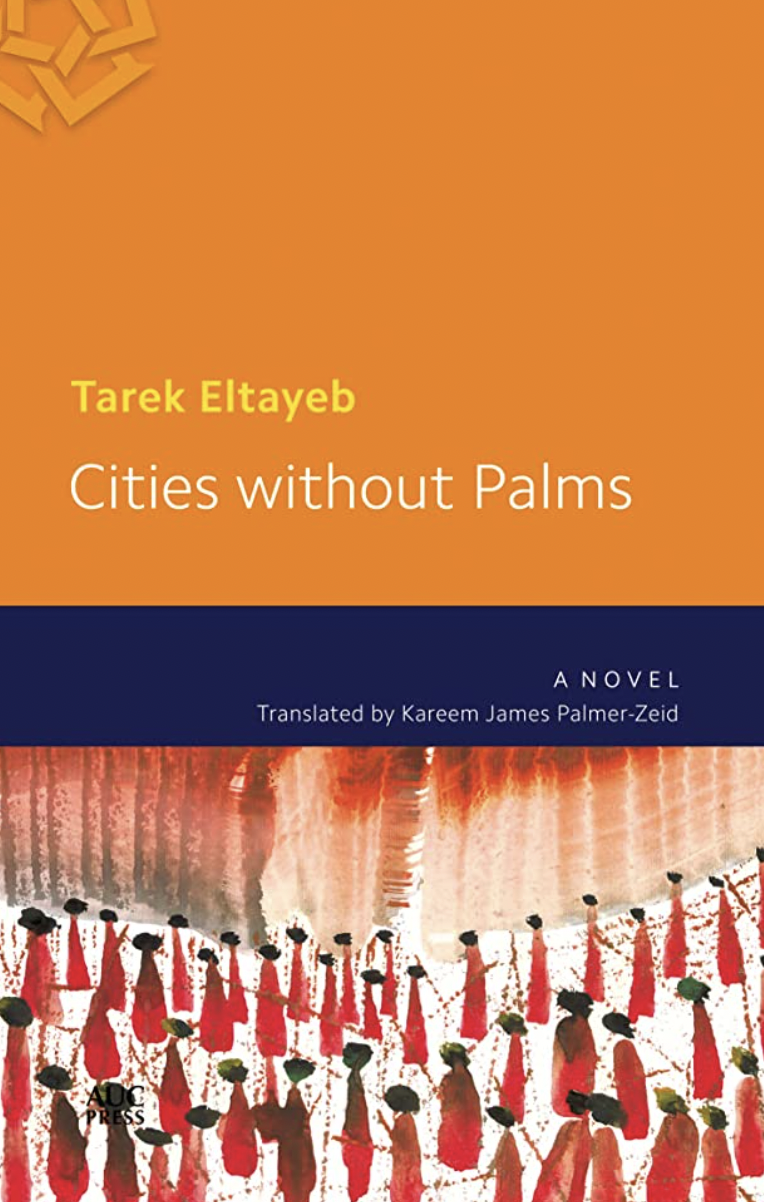
Tarek Eltayeb, Cities Without Palms (Arabic, 1992 and translated into English by Kareem Hames Palmer-Zeid, American University in Cairo Press, 2009).
“I feel lost. I feel as if I were in the middle of a vast, boundless sea: everyone must swim here, myself included.”
As drought and famine ravages Sudan’s rural interiors, protagonist Hamza leaves for the big city of Omdurman hundreds of miles away, in hopes of a job that can save his family from starvation. Nostalgic at heart and self-admittedly naive in the ways of the world, Hamza takes the train for the first time, meeting young hopefuls like himself along the way. Though his city career starts off with petty robberies, he soon finds himself a salaried employee for a shop owner. This is not destined to last long, since a romance blossoms between him and his employer’s young second wife.
Rumors of good jobs in Cairo take Hamza on yet another journey and he finds himself settling into the bustle of Egypt, yet discontent with the lack of a stable job. After an arduous wait for a passport, Hamza eventually makes his way to Europe, where his migrant journey takes a turn for the worse. He finds himself without a way to navigate the culture, language or cold weather. In these cities without palms, Hamza plunges to his lowest depths. Eltayeb’s sparse, short novella offers a melancholic portrait of the shackles of poverty and a migrant’s despair.
The themes and style are reminiscent of Nobel laureate Abdulrazak Gurnah, who is also attracted to exile and weaves many a story of young men on complicated and nostalgic journeys across East Africa and into Europe. The prose is poetic and immersive, which is no surprise given that Eltayeb is also an accomplished poet. Cities without Palms ends rather abruptly, but is followed by a sequel titled, The Palm House, flawlessly translated by the same translator, Kareem James Palmer-Zeid.

